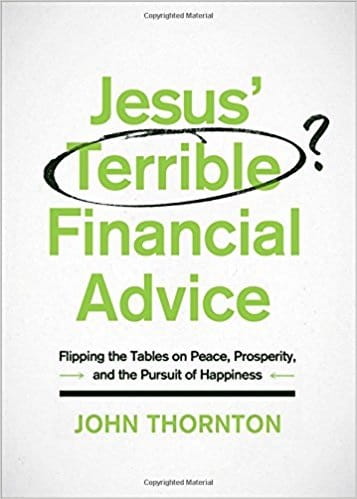The Great Giving Paradox

“Give to everyone who asks you, and if anyone takes what belongs to you, do not demand it back.”
I am torn on how to begin to write about giving. On the one hand, it is impossible to love without giving. I don’t know if you ever thought of love that way before, but it’s true. And the greater the love, the greater the gift . As Jesus said, “Greater love has no one than this: to lay down one’s life for one’s friends” (John 15:13). And He would know. He spoke those words to His friends the night He was betrayed by one of them. Jesus, God in the form of a man, humbled Himself and gave us the greatest gift humanly possible.
Likewise, God the Father gave the greatest gi heavenly possible: “For God so loved the world that he gave his one and only son . . .” In case you missed how costly that was, God gave up the one thing He couldn’t make more of, His Son, and in doing so not only gave the thing most valued by Him, but silenced His critics who might otherwise claim that any gift from God was of no cost at all, as He could just make more.
So great loving begins with great giving.
On the other hand, I can think of no other thing that has the power to puff a person up like giving. Both in their own eyes and in the eyes of the world. What could be more noble? What could be more sel ess? What could be more desired?
Everybody wants to be close to a person who gives gifts. The praise flows. But our quest for praise is dangerous. As Solomon said, “A crucible for silver and a furnace for gold, but people are tested by their praise” (Prov. 27:21). Knowing this, Jesus warned, “When you give to the needy, do not let your le hand know what your right hand is doing” (Matthew 6:3).
Be careful, then, how you give. Because great giving is not necessarily great loving. Paul warned, “If I give all I possess to the poor and give over my body to hardship that I may boast, but do not have love, I gain nothing” (1 Cor. 13:3).
Giving to God
If you ask people what God says about money, most will tell you that He wants you to give it to Him. Everybody’s heard “that sermon.” It’s the excuse some people use for avoiding church altogether. They’re afraid they might come on the day “that sermon” is preached. en they’ll have guilt. Or they’ll be impoverished. Either way they lose.
IT is impossible to love without giving . . .
and the greater the love, the greater the gift . . .
but great giving is not necessarily great loving.
Even if the pastor doesn’t preach on money, sooner or later they’ll pass the plate. Awkward. Then you have to avoid eye contact with the bouncers coming down the aisles. There’s nowhere to hide. You have to fake like you’re really into the worship band. Or the organist. So you’re stuck sitting there, wishing you’d thought ahead, like the guy next to you, who stuffed his pocket full of one dollar bills wrapped in a $20. Then you could minimize the damage and get out with your head held high.
But here’s a news ash for all you out there who think God wants your money. He doesn’t. God does not need your money. God does not want your money.
He wants you. He wants your heart. But He also under- stands that “money is the answer to everything” (Eccl. 10:19) in that it is the metric we use to quantify our hopes and dreams. When we give money, we’re actually giving our time, talents, and treasures, all wrapped up in one. Anytime we give, we give up what we could have used that money for—anything from food to entertainment to a day o work to early retirement. Whatever our heart desires. In giving, we’ve put someone else’s needs ahead of our own. Giving is the cost of our love.
As I mentioned earlier, when I set out to write a book about God’s perspective on money, His command to “give to everyone who asks you” knocked me o my high horse and set me on my rear. In fact, at one point all I could hear was “give it all away...give it all away...GIVE IT ALL AWAY!”
How natural it was for me to conclude, then, that my giving is what it’s all about. Yet when I classified over 1,300 passages of Scripture into twenty-three categories, our giving didn’t even make the Top Five list of things the Bible says about money. Not “giving to God,” not “giving to the poor,” nor “giving to others.” And nothing could have surprised me more. Giving just had to be at the top of the list. I must have missed something. Something had to be wrong with my math. My mind was screaming, “ is cannot be!”
IN giving, we’ve put someone else’s needs
ahead of our own. Giving is the cost of our love.
What could possibly have crowded out God’s commands to give? As I looked back over the list, the answer was surprisingly simple.
He did.
God was so busy giving to us that His giving crowded out any amount of giving on our part. God was so busy giving us everything we need, from here to eternity, that His commands for us to give are stuck in the back seat. I missed this, because I was so pent up by Jesus’ command for me to “give to everyone who asks” (Luke 6:30). That command convicted me and left me stunned. Frozen. Like a deer in the headlights.
How could I be so blind? So deluded? So arrogant? So slow? So childish? I was so spun up about God’s commands for me to give that I missed the big truth.
TRUTH:
God is the real Giver.
My attitude toward giving reminds me of how my young sons used to respond when I asked them for one of their French fries. You know, the ones I’d just bought them. Under great duress, they would sort through the scraps and find one short enough to spare. That’s how I often treat God. Even though all I have comes from Him.
And when we finally do give, we’re tempted to perform a victory dance like a rookie running back in the end zone of his first Super Bowl. “Bam, baby! Thank you, Jesus, for making me me!” The truth of the matter is that God doesn’t need your money. In fact, there is nothing you have that God needs. In God’s eyes, even the richest one among us is dirt poor. “Surely the lowborn are but a breath, the highborn are but a lie. If weighed on a balance, they are nothing” (Ps. 62:9). Any amount of money we have, regardless of how much, when compared to His wealth, is nothing. To put this in mathematical terms, anything divided by infinity is zero.
This is not to say God does not want us to give. Far from it. There are numerous commands for us to give, which fit nicely into three main categories: giving to God, giving to the poor, and giving to others. But we need to take a deeper look at why God wants us to give.
Why Give?
“Since God has so much already, why does He ask us to give at all?”
I think that’s a fair question. Especially since He doesn’t need it. And He knows better than us who does.
From the Scriptures, I see at least three clear reasons God calls us to give: (1) to know Him better, (2) to set us free from Money as a master, and (3) to enrich us.
To Know Him Better
When we give, we come to know God better. To know His character. at He is a giver. That He is the Giver. “Every good and perfect gift is from above, coming down from the Father of heavenly lights, who does not change like shifting shadows” (James 1:17). Just as we love Him and others because He first loved us, we also give because He first gave to us. When we give, we reflect His character. When we give as God intended, we more fully understand and know the Lord. The prophet Jeremiah writes,
This is what the Lord says: “Let not the wise boast of their wisdom or the strong boast of their strength or the rich boast of their riches, but let the one who boasts boast about this: that they have the understanding to know me, that I am the Lord, who exercises kindness, justice and righteousness on earth, for in these I delight,” declares the Lord. (Jer. 9:23–24, emphasis added)
Godly giving, then, is kind, just, or right, and oftentimes all three.
How is God’s character reflected in our giving? I think it looks something like this.
When we give to “everyone who asks” (Luke 6:30), we show God’s kindness. Kind giving has nothing to do with the recipient’s merit. Kind giving is what Jesus refers to when He says that His Father “is kind to the ungrateful and wicked” (Luke 6:35), that he “causes his sun to rise on the evil and the good, and sends rain on the righteous and the unrighteous” (Matt. 5:45). God’s kindness, like His love, has everything to do with His character, and nothing to do with ours.
GOD’S kindness, like His love, has everything to
do with His character, and nothing to do with ours.
When we give to those who merit our gift, we show God’s justice. Just giving is what God does when He blesses those who walk in His ways.
Blessed is the one who does not walk in step with the wicked or stand in the way that sinners take or sit in the company of mockers, but whose delight is in the law of the Lord, and who meditates on his law day and night. at person is like a tree planted by streams of water, which yields its fruit in season and whose leaf does not wither—and whatever they do prospers. (Ps.1:1–3)
When we give to the poor, fatherless, widow, and foreigner, we show God’s righteousness. Right giving sees those in need, and meets their needs. Jesus tells us,
“So do not worry, saying ‘What shall we eat?’ or ‘What shall we drink?’ or ‘What shall we wear?’ For the pagans run a er all these things, and your heavenly Father knows that you need them. But seek first his kingdom and his righteousness, and all these things will be added to you as well.” (Matt. 6:31–33)
When we feed and clothe the poor, fatherless, widow, and foreigner, through His wisdom, we join the Defender of the Weak and give what is right.
Godly giving brings glory to God. Looking after widows and orphans in their distress (James 1:27), clothing and feeding those in need, forgiving as we have been forgiven, are all ways to “let your light shine before others, that they may see your good deeds and glorify your Father in heaven” (Matt. 5:16).

DR. JOHN THORNTON is a CPA with a Ph.D. in Accounting from Washington State University. He is the L.P. and Bobbi Leung Chair of Accounting Ethics at Azusa Pacific University, a Christian university near Los Angeles, CA where he directs the School of Accounting. He has served as Chair of the American Accounting Association's Public Interest Section. He is married with three sons.
Image courtesy: Thinkstockphotos.com
Publication date: March 22, 2017
Originally published March 22, 2017.





